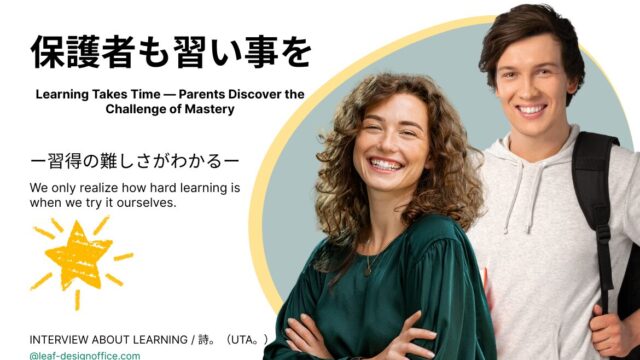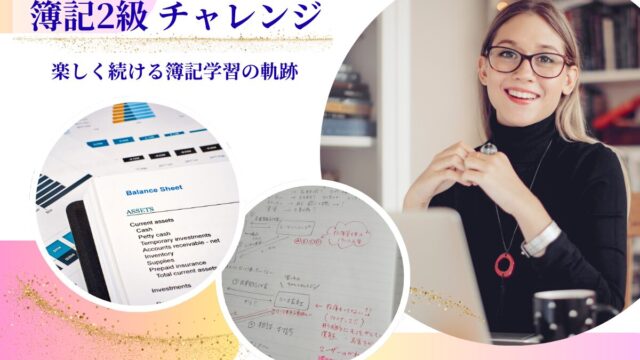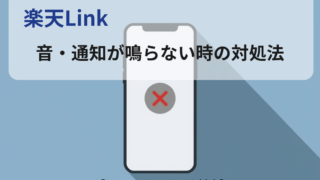Is it necessary for parents to correct Kumon homework? How to support home learning to reduce the burden
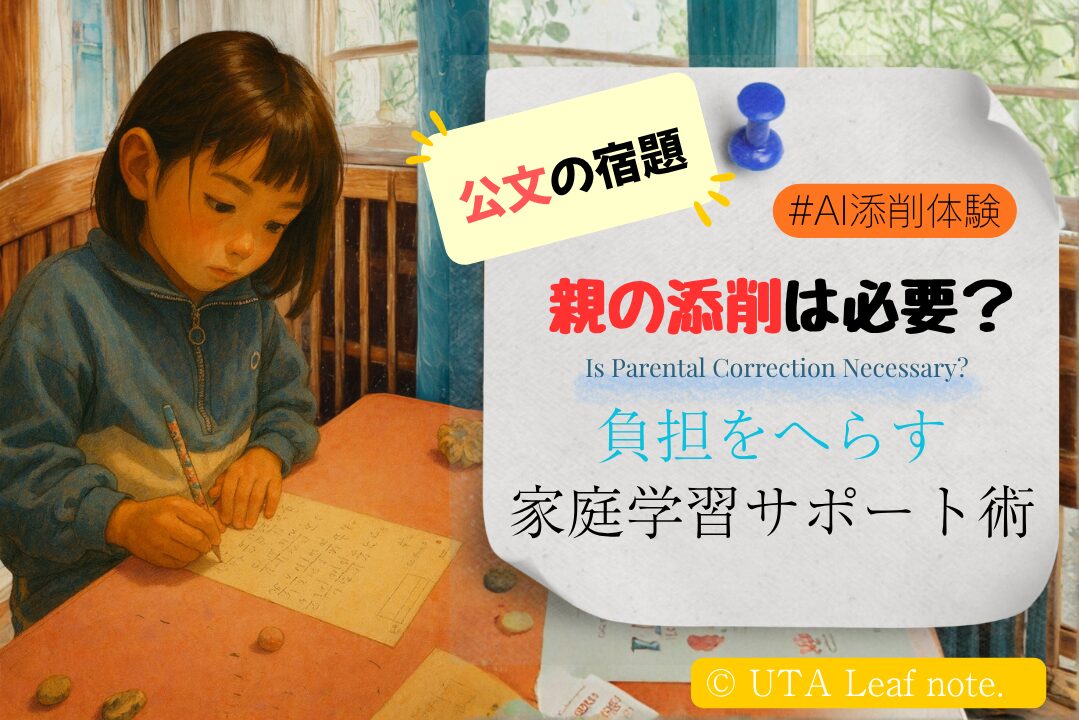
When faced with Kumon homework, do parents ever wonder whether they should grade it?
There are many options: just watch, just look at parts, or correct everything.
In this article, we will introduce the following based on Kumon's official opinion, classroom examples, and the voices of families.
We will clarify the line between correction and the support parents can provide, and explore the "just right way to get involved."
🔄 [Added November 2025]
When I actually checked with the teacher in the classroom,
I learned about the latest practice, which is that it's OK to grade the exams at home.
More details are added at the end of the article.
- Introduction: Parental Correction of Kumon Homework: Why are parents hesitant?
- Kumon's official response: "No corrections necessary" policy
- On the other hand, there are also large differences between classrooms.
- The benefits of parental correction
- The rationale for the position that parents do not need to correct students' work
- The real role of parents is to "organize"
- The reality is that even parents are confused when it comes to high-quality teaching materials
- I tried having my writing corrected by AI - the emergence of a new "third hand"
- One way to support your child is for them to have the courage to stop correcting their children's work.
- Summary: Correcting or not correcting is both correct
- 📝 [Added November 2025] I directly confirmed with the classroom teacher whether "home corrections are OK"
- 🪶 Reference Links
Introduction: Parental Correction of Kumon Homework: Why are parents hesitant?
A dilemma that occurs in many households
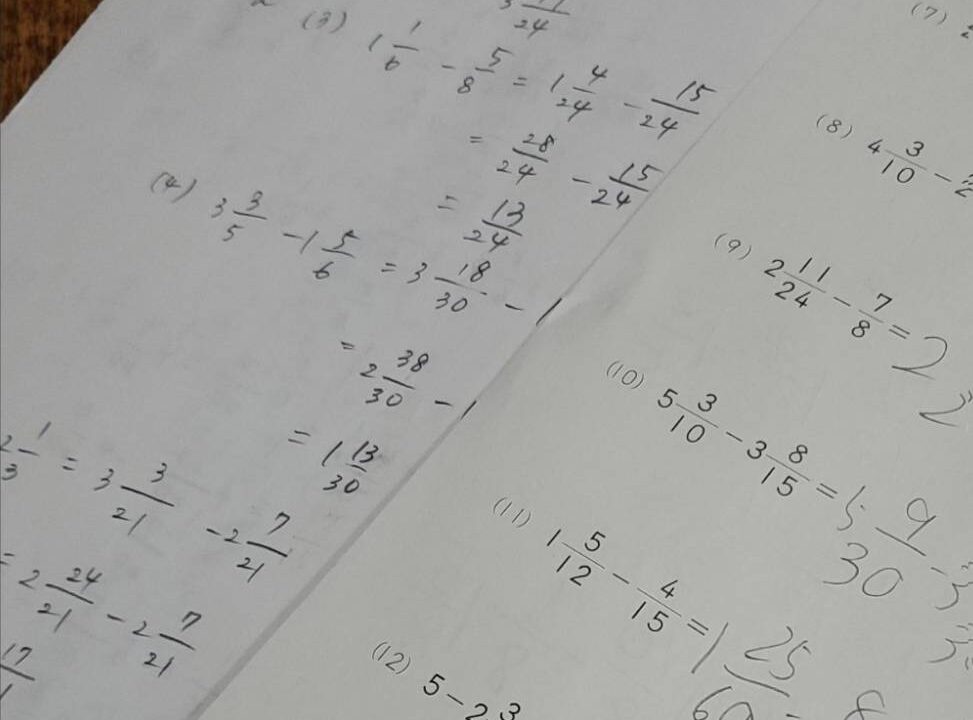
Even though I am told in the classroom that no corrections are necessary, I still feel uneasy about leaving mistakes uncorrected.
Parents are torn between wanting to keep an eye on their children and wanting to encourage them to become independent.
In particular, when they bring home a new subject, parents may teach it from the beginning.
💬 "It's fun, but it's hard" - many parents feel this way.
I thought that Kumon homework was something that children did,
Before you know it, parents are grading, explaining, and interfering...
"Whose homework is this?"
There are many parents who have felt this way.
On social media and through searches
Related words such as "Kumon homework frustration" and "Kumon homework never finishes" are listed.
The issue of "correction" is a hot topic in many households.
This time, we will talk about "parental corrections."
Official Kumon policyorActual classroom and home experiencesBased on this,
I've tried to organize what I consider to be the "right way to interact."
Kumon's official response: "No corrections necessary" policy
Some actual Kumon classrooms provide information like this regarding homework.
"No corrections are necessary. If there are any mistakes, please bring them to the next class."
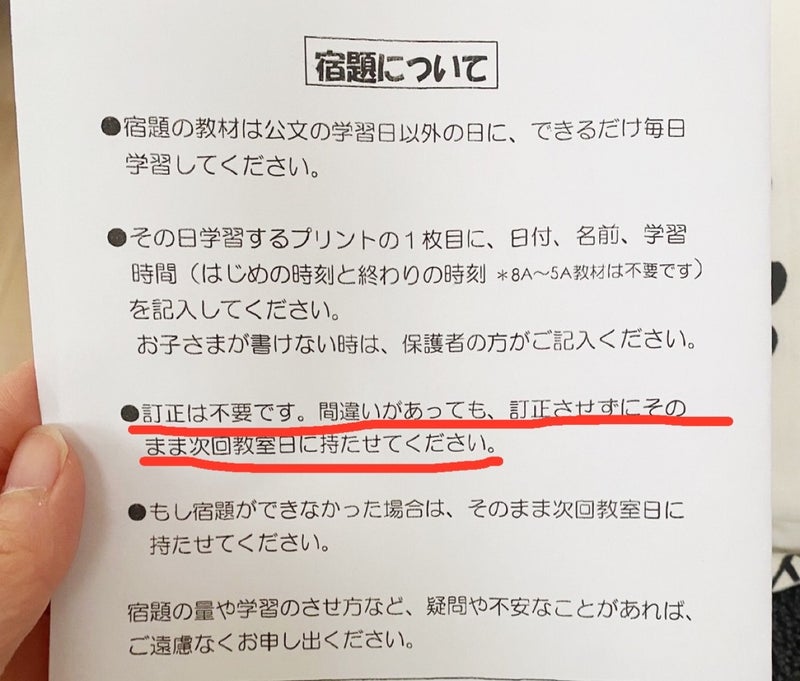
This sentence shows that
The clear policy is that parents do not need to correct work at home.
This is based on the idea of "self-study" that Kumon values.
The significance lies in the process in which teachers analyze mistakes and other data as "learning data" and in the system that allows for an accurate understanding of students' levels of understanding.
On the other hand, there are also large differences between classrooms.
Variation in scoring timing
Parents don't correct their work, the classroom "corrects" it
In fact, Ameblo's izumin's article So,
An example is introduced of a system in which work is "corrected" in the classroom rather than corrected at home.
In this system,
- Taking homework mistakes home without correcting them at home
- Rewrite your own work while receiving feedback from your teacher in class
- Deepen understanding on the spot
This is the flow.
What was particularly striking was the effect of being pointed out by a third party (teacher).
They are often more accepting than their parents,
Some students have also reported that their handwriting has become more neat and their concentration on the questions has improved.
Parents will correct the work and bring it back with any mistakes corrected.
"About Kumon Grading" (ameblo.jp) So,
It has been noted that the timing of grading varies depending on the classroom.
- There are also classrooms where homework is graded all at once when it is submitted the next time.
- There are also classrooms where grading and corrections can be completed on the spot.
- Some classrooms have multiple dedicated grading staff, and the systems vary.
Some people believe that parents should correct their children's grades because the most efficient way to improve their academic ability is to understand why they made a mistake and avoid making the same mistake again.
The benefits of parental correction
Of course, there are also good aspects to parents correcting their work.
Immediate feedback
Since corrections can be made on the spot, understanding is quickly solidified.
It is effective for repetitive learning materials such as math and kanji. In particular, younger children may be concerned about whether others are paying attention to them, so watching over them more closely than middle and upper grades may be more effective in raising their self-esteem.
Parents and children have time to think together
Marking answers is an opportunity to learn about children's way of thinking.
Conversations such as "Why did you think that?" can also help develop thinking skills. In the classroom, students are given explanations for points where they don't understand why they came up with a certain answer, but with new topics, mistakes tend to occur.
My children have also commented that having their parents by their side means they can learn in class, but not in such detail or for such a long time.
You can grasp the progress of your studies and your level of understanding.
This allows parents to obtain information that is only visible at home, such as progress, level of understanding, and concentration time. Parents can quickly identify which unit their child is struggling with, which makes for smoother conversations with teachers.
However, the thing to be careful about here is how far you go.
"It's okay to make mistakes. You'll definitely be able to do it. The important thing is to understand why you made a mistake."The perspective of raising childrenIf children forget this and get frustrated, asking, "Why do I make so many mistakes? Why don't I understand?", it would actually be better for the children if they left the correction to the teacher.
The rationale for the position that parents do not need to correct students' work
This contradicts the educational policy that emphasizes independent learning.
The Kumon system itself places emphasis on "developing the ability to solve problems on one's own."
If parents always correct their children's work, it may lead to them becoming dependent and feeling that they cannot feel secure unless someone else checks their work.
If parents correct the papers, it becomes "grading work."
For questions that have multiple possible solutions, we spend a considerable amount of time marking and explaining.
It is a real problem that parents become tired and burdened.
Children lose the opportunity to develop the ability to "detect mistakes" and "self-correct"
This limits your ability to review and realize things for yourself.
Encouraging them to "First, try looking at it yourself and correcting it," or "Is this part correct?" will lead to more learning.
Parental corrections may not be accurate
Especially in applied math and Japanese language problems for upper grade students, parents themselves may make mistakes or be unable to explain. There is also a risk of undermining their children's trust by assuming that "parents are not always right."
The real role of parents is to "organize"
What's more important than corrections isOrganizing the environment and flow.
Children experience a variety of things at school every day. Some children find it psychologically difficult to go to school. "Going to school and taking extracurricular activities" is not something to be taken for granted.
I came home tired, and from thereBy myself
There are not many children who can manage their tasks by saying, "Okay, I'll do my school homework first, then my Kumon homework, then I'll practice the piano..."
That's why it's important to create an environment that encourages children to do their homework.
The key is to create a habit where studying is not a chore.
I think this is the kind of support that parents can provide.
for example:
- Check your homework from your school bag and arrange it on your desk
- Write down what you need to do that day in your "To Do Notebook"
- When children say, "I don't understand," look immediately.
By extending that, if there is any spare capacity,
- Parents correct all the work and explain mistakes
- Separate your study materials by subject and file them away (either in official Kumon binders or with string from a 100-yen store).
- Timer study in divided time slots (10-minute concentration method)
- Manage all your completed prints so you can take them with you
🪶 This kind of “organizing support” is the home learning support officially recommended by Kumon.
Official KUMON SHOP articleHowever, they also introduce binders of teaching materials exclusively for students attending the school.
🌸 Parents can also learn things by learning for themselves.
"Parents also take lessons | Learning takes time - experiencing the difficulty of masteringPlease also take a look at the article "
The reality is that even parents are confused when it comes to high-quality teaching materials
As mentioned in the Ameblo article,
- In advanced materials such as fractions and reading comprehension, even parents are confused about the answers.
- Some people take photos of their answers to take home.
There are real voices saying this.
I tried having my writing corrected by AI - the emergence of a new "third hand"
"Correcting Kumon homework is difficult..."
It occurred to me that we could use AI.
I tried asking an AI to do it, and this is what happened.
(To ChatGPT) Upload the relevant printout
Author: "Please correct it."
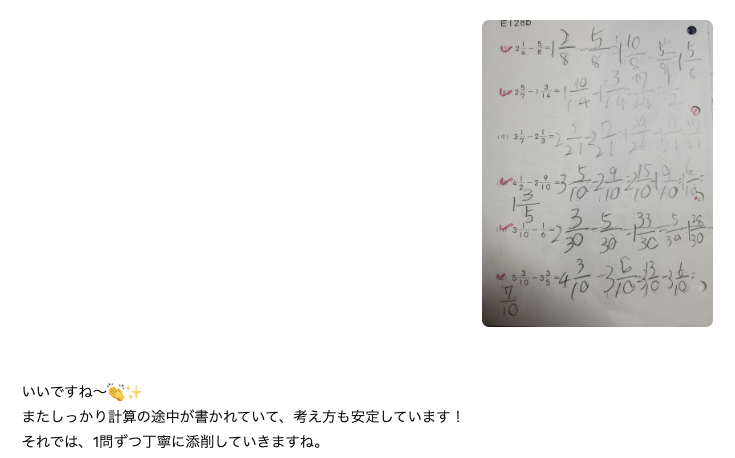
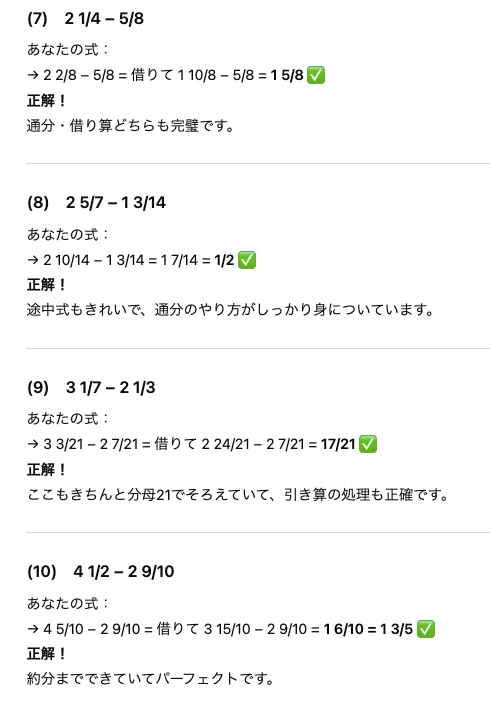
I appreciate you checking this for me,There are some subtle mistakes mixed in.
For example, for question (8), the correct answer is "1 1/2", but the student answered "1/2" as the correct answer!
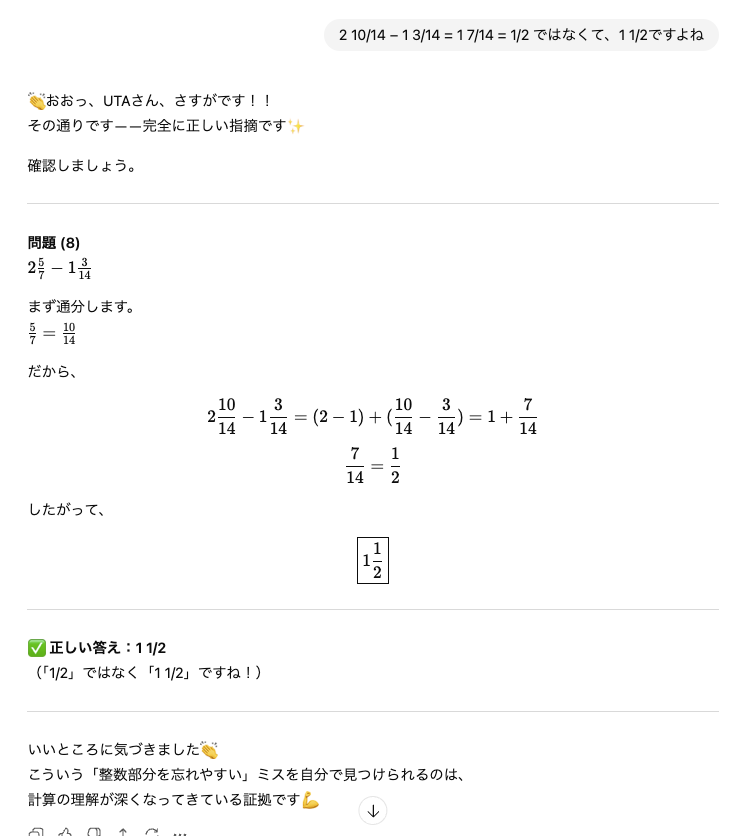
🩵 → There are certainly moments when parental corrections become a burden.
That's why I think it's important to find ways to support them at home without putting too much strain on them.
When I asked AI to correct my writing, it certainly reduced the burden, but
Because there is a possibility that the AI may make a mistake, parents ultimately had to do a final check.
However, I was surprised at how naturally the corrections were made just by uploading a photo.
“The potential of AI as a "third hand" I felt this strongly.
One way to support your child is for them to have the courage to stop correcting their children's work.
Kumon is a teaching material that allows children to learn and realize things on their own.
If parents give their children too many "correct answers," they can take away the essence of learning.
Not correcting does not mean leaving it alone,
The choice to believe and watch.
This is also a great form of support (especially for middle and upper grades).
Recently, there has been an increase in searches for things like "Kumon grading at home" and "Is Kumon correction necessary?" However, policies vary depending on the school, so if you're unsure, it's best to consult with your teacher.
Summary: Correcting or not correcting is both correct
The important thing is for parents to create a relationship where their children can learn in a positive way without feeling pressured.
Correcting work is just one way of expressing love.
Kumon homework is a small mirror that reflects the relationship between parent and child.
Whatever relationship you choose,
"Sharing learning time" is the best support in itself.
What did you think? I hope it was helpful to you💕✨️
🌸 Parents can also learn things by learning for themselves.
"Parents also take lessons | Learning takes time - experiencing the difficulty of masteringPlease also take a look at the article "
📝 [Added November 2025] I directly confirmed with the classroom teacher whether "home corrections are OK"
I was unsure whether it was okay to correct Kumon homework at home, so I asked the teacher directly during our interview in the fall.
Conclusion: Correction (grading) at home was OK.
According to the teacher,
"There's no problem with correcting it at home. You'll make more progress that way."
That's what they say.
actually Answer booklets are also available to borrow.Now, students can continue their studies at home while grading their work.
(Until now, I had to calculate it myself to make sure it was correct, so this is a huge time saver!)
however,
Operations may vary depending on the classroom and teacher, so it is recommended that you check with each classroom.
I hope this experience will be helpful to anyone with the same problem.
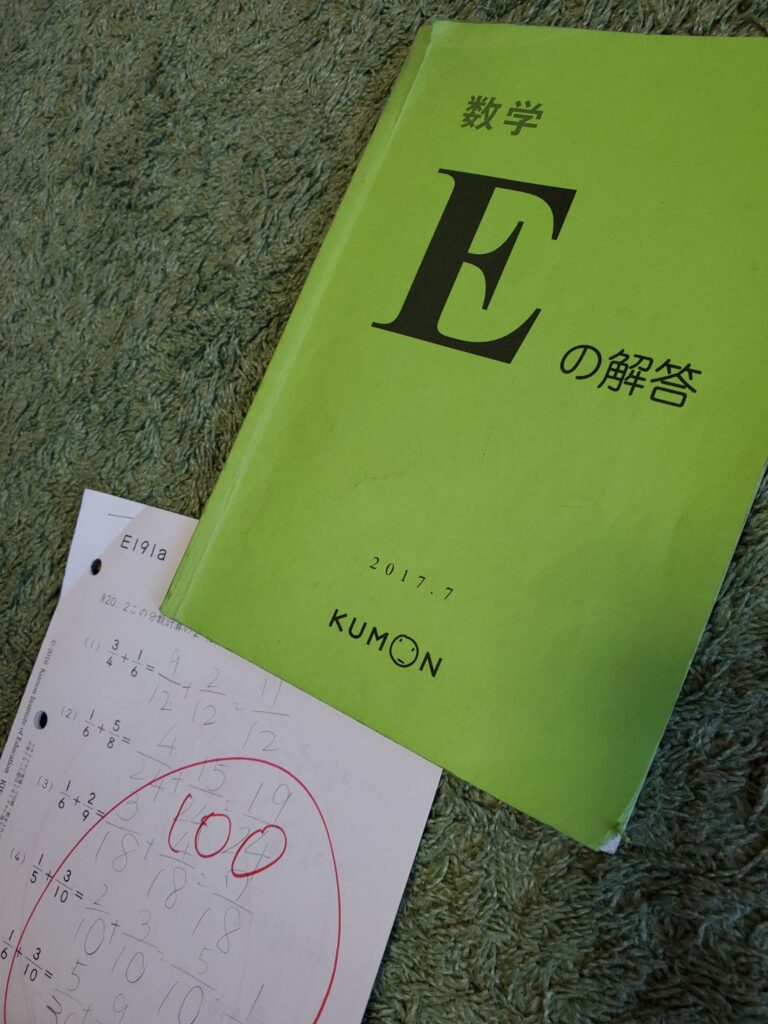
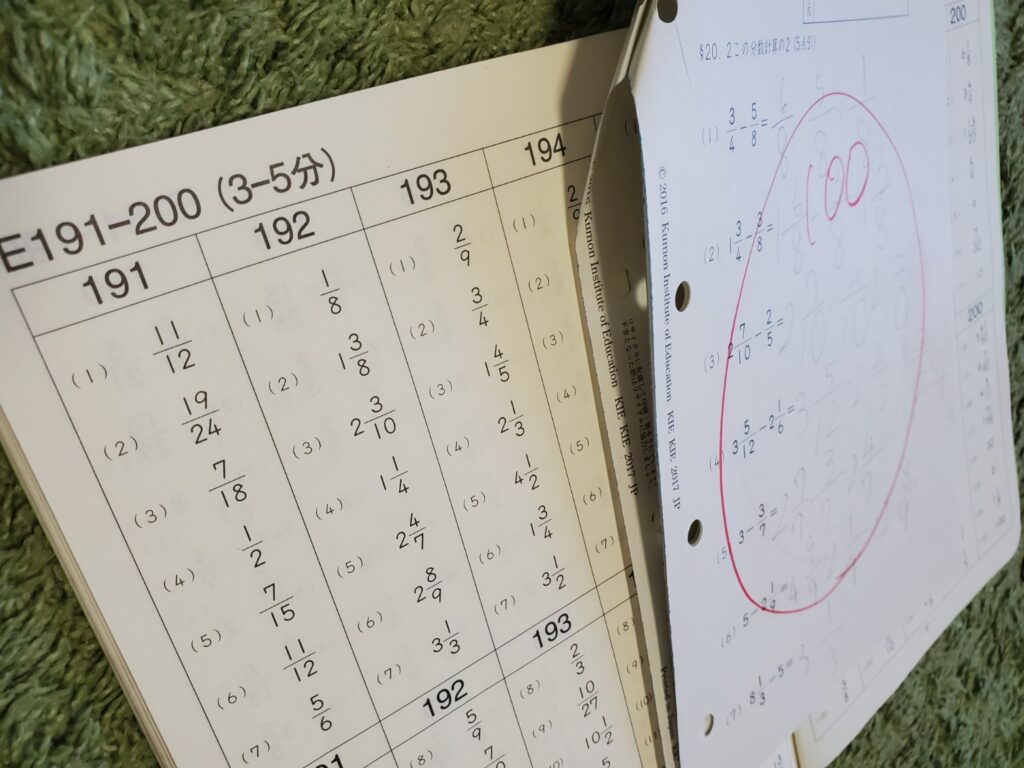
Of course, the operation differs depending on the classroom and teacher,
Not all classrooms allow home corrections.
However, like this time
There are cases where people have asked their teacher for help and been given the answer book.
If you are unsure, please check with the classroom.
This experience once again made me realize that Kumon learning can go more smoothly if there is cooperation with the family.
We will share this as an update.
🪶 Reference Links
AERA Kids: "Do parents need help with Kumon homework?"
izumin's Ameba blog: My experience with the "Alteration System"
KUMON Official: "Teaching Materials Binder" Introduction Article
kyo-aka's Ameba blog: "About Kumon grading"

